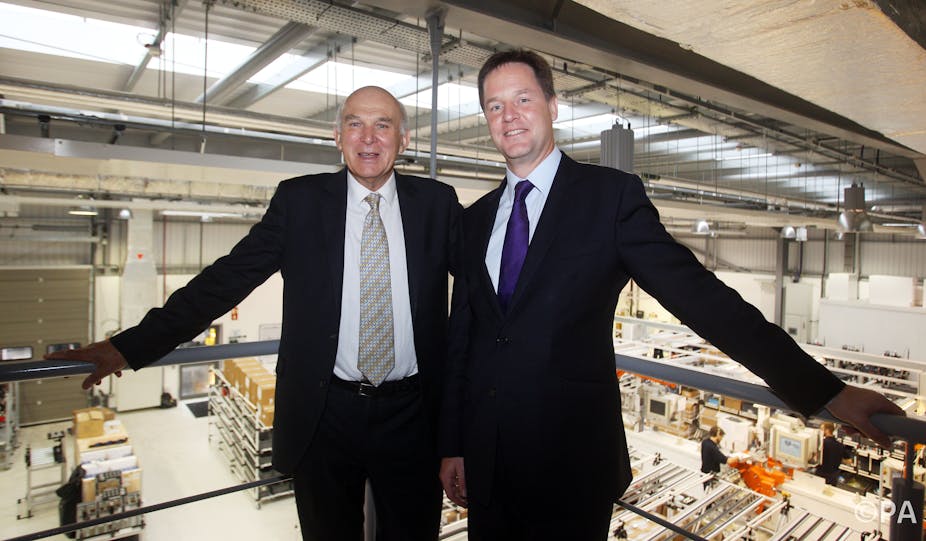In a post for The Telegraph the Conservative MEP and journalist Daniel Hannan, reckons that the Liberal Democrats are finished. Referencing both William Shakespeare and Walter Scott, Hannan claims the recent elections for the European Parliament and local councils in the UK were the beginning of the end for the Liberal Democrats: “nothing will come of nothing … as the Lib Dems slide away, unwept, unhonoured and unsung”.
As always with Hannan, there are some good points. The Liberal Democrats are indeed an ideologically split party, as outlined by Katharine Dommett here last week. Founded by a merger of the Social Democratic Party and the Liberal Party, the party can be simplistically labelled as a mixture of economic liberalism and social liberalism, and it has become fashionable to insist that while the party could sit comfortably with such differences when in opposition, it is much trickier when in government, particularly as a minority party.
But it is not so straightforward. Whilst Nick Clegg has struggled to win over the socially liberal minded in his party, it is not as simple as “left” and “right”, or “orange” and “yellow” liberalism. Yes, Nick Clegg wrote a chapter in The Orange Book. He also wrote a chapter in the Social Liberal Forum publication Reinventing the State. The party is divided in places, but is still united on many different issues: constitutional reform, the environment, the European Union, internationalism, civil liberties and in many cases, taxation.
Critique of ‘pure liberalism’
For Hannan, the problem goes back longer than the Liberal Democrats’ inception. The party has been “overwhelmed by a horde of petty, calculating careerists” and, today, “pure” liberalism is best merged with conservatism and rests most comfortably today in the Conservative Party. Of course, this only makes this sense if you first accept that a “pure” liberalism exists, and if so, one that is more applicable to 19th-century political philosophy than 21st-century party politics. The Liberal Democrats have always championed a more modern, “new” form of liberalism than the one Hannan describes.
The challenge for the Liberal Democrats will be to convince its potential supporters that it can be a unified and viable opposition to both Labour and the Conservatives, instead of being an unconditional supporter of them depending on the electoral circumstance – or, as Lord Oakeshott put it last week: a “split-the-difference centre party, with no roots, no principles and no values”.
In the short term, that will be difficult. We are not about to see the Liberal Democrats suddenly recovering sharply in the polls. Redefining themselves as a centrist force in British politics will be a painful process but a necessary one for the Liberal Democrats if they are to survive as a genuinely national political party.

Hannan clearly is not convinced. With regard to his interpretation of liberalism, he asks the following question:
Has this sublime tradition, the tradition of Edward Coke and John Hampden, of James Harrington and Algernon Sidney, of John Milton and John Locke, of Pitt the Elder and Edmund Burke, of Earl Grey and Viscount Palmerston, of Richard Cobden and John Bright – and, yes, of Benjamin Franklin and Thomas Jefferson – truly found its quietus in the person of Nick Clegg? The thought is almost unbearable.
One could, of course, ask whether the conservative tradition of Edmund Burke, Samuel Coleridge, Benjamin Disraeli, Quintin Hogg, Rab Butler, Keith Joseph and Michael Oakeshott has truly found its quietus in the person of David Cameron. To frame questions in such a crude fashion seems intended more to belittle the person in question, rather than to discuss Hannan’s more pressing concern: to what extent are the Liberal Democrats finished?
Still in rude health
The answer: not necessarily. While the Liberal Democrats are in a weaker position than in 2010, they are not weakened to the extent that they are necessarily destined for a long period in opposition. The relative weakness of the party’s appeal nationally has often meant that Liberal Democrat MPs’ re-election has been more dependent on personal popularity and local activity than it has for Labour and the Conservatives. If the Liberal Democrats are going to collapse electorally in 2015, then it should be expected that their strongest local organisations will be crumbling. Examining the Liberal Democrats’ strongest local organisations’ income and expenditure post-2010 compared with post-2005 can demonstrate the extent to which this is the case.

The data (obtained from the Electoral Commission, and available in more detail here) shows mixed results for the Liberal Democrats post-2010. The broad strength of the Liberal Democrats’ local associations appears weaker. However, in their strongest areas, on average, the Liberal Democrats are earning and spending more post-2010 than post-2005. Perhaps most importantly, those Liberal Democrat constituency parties with incumbent Liberal Democrat MPs appear to be financially stronger post-2010 than post-2005. While membership data is available, it is patchy and not conclusive.
Although last week’s local election results were hardly inspiring for the Liberal Democrats, they did well enough where they have MPs to suggest that they have the potential to retain enough seats to hold the balance of power again after the 2015 election. In short, a hung parliament with the Liberal Democrats as the third largest party is still perfectly possible.

As discussed, the long-term challenges are not going to go away. As Dommett rightly outlines: “the party no longer presents an ambiguous identity capable of amassing appeal from a range of sources”. That does not mean though, to disagree with Hannan, that they are no longer able to represent a strand of liberalism within British politics. Indeed, Hannan argues that “they weren’t really anything at all” in recent years. I disagree with this assessment: for four years they have been a governing party, and there are many reasons to suggest that they can be again. Are they finished? Not yet.

